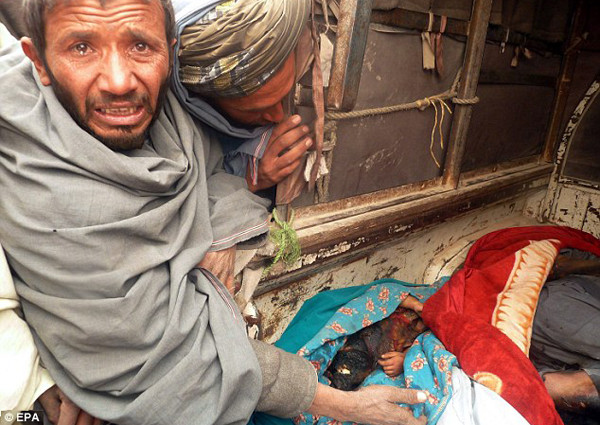By Jack Kimball

Disbelief: Two grief-stricken Afghan men look into the van where the body of a badly burned child lays, wrapped in a blue blanket. A US soldier opened fire and killed 18 innocent civilians on March 11, 2012 in Kandahar, Afghanistan.(Photo: EPA)
In Afghanistan, if NATO forces kill a member of your family, it is better in terms of money if they come from Germany or Italy than the United States or Britain.
In the cold calculation of how much to pay for victims of the decade-old war, British forces have doled out as little as $210, while German forces have paid as much as $25,000, according to a study by the human rights NGO CIVIC.
Civilian casualties caused by NATO forces hunting insurgents are a major source of friction between the Afghan government and its Western backers - all the more so after a lone U.S. soldier gunned down 16 Afghan villagers at the weekend.
"They have to ask themselves the question how much is one's life worth? You can't put a price on it," Rafi Nabi, 33 and unemployed, said in a market in the Afghan capital.
"If one were to kill an American and offer to compensate their death with money, they wouldn't accept it."
It was unclear if the United States intends to pay reparations to the families of 16 people suspected to have been killed by the U.S. staff sergeant in a remote area of the southern province of Kandahar, the traditional Taliban stronghold. Eleven victims were said to come from one family.
The United States usually pays up to $2,500 for civilians killed in lawful operations such as air strikes, according to an investigation by CIVIC, a rights advocacy group. The study, compiled two years ago, has been regularly updated.
"The shooter clearly violated the laws of war, human rights law and the U.S. military code of justice. In these type of situations, we call for accountability and justice as well as compensation for harm done," Trevor Keck, an investigator with CIVIC, told Reuters in an email.
British forces have paid out between $210 and $7,000 while German troops provided $20,000 in cash and a car worth $5,000 after shooting three people at a checkpoint in 2008, the report said. In 2009, Italy disbursed $13,500 to the family of a 14-year-old girl who was shot dead, it said.
A series of incidents over the past month, including the burning of Korans at a NATO base and the massacre in southern Afghanistan, have stirred debate about the withdrawal timetable for foreign troops, with some asking for a faster pullout.
HEIGHTENED TENSIONS
The blunders have also heightened tensions between Kabul and Washington at a time when the United States is in delicate talks with Afghanistan over its future presence after most combat troops pull out at the end of 2014.
Based on interviews with NATO and Afghan civilians, CIVIC found that compensation payments plus an apology were key to lowering hostility toward foreign troops in Afghanistan, now at a peak again over the Koran burnings and the shootings.
There is no standard mechanism for Afghans to report civilian casualties, much less seek compensation, reducing both the hope of redress and any sense that justice is being done.
Rules often require even illiterate villagers to decipher which unit came to their home and then go to its main base - sometimes hundreds of km away down unsafe roads. And to complicate matters, most villagers do not readily distinguish between foreign troops from different countries.
As the war drags on into its 11th year, security forces battling the militants killed 410 civilians in 2011, a drop of 4 percent from 2010, the United Nations said, with the total number of civilians killed last year exceeding 3,000.
"The Americans have seen that the Afghan people are poor and desperate. If a woman loses her husband, she needs money to sustain her living. What else can they do? They have no power," said film maker Maroof Nazir, 27.
"Will the government hear their voices or help them? No. When you have no power, you're forced to take the money and say thank you to the same people who killed your families, what else can you do?"
(The story alters the first paragraph to make it clear that Italy and Germany refers to NATO forces)
(Additional reporting by Miriam Arghandiwal; Editing by Rob Taylor and Ron Popeski)



